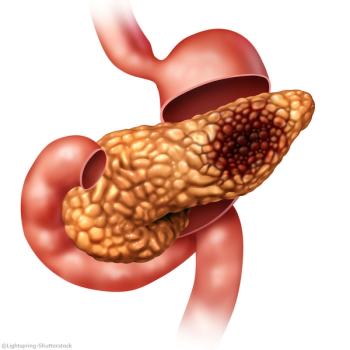
Oncology NEWS International
- Oncology NEWS International Vol 17 No 2
- Volume 17
- Issue 2
Benefit of adjuvant RT/CT for pancreatic ca affirmed
Patients who undergo complete resection of invasive adenocarcinoma of the pancreas are roughly two-thirds more likely to be alive at 5 years if they receive adjuvant chemotherapy and radiation therapy, compared with no adjuvant therapy, according to the 30-year Mayo Clinic experience.
LOS ANGELESPatients who undergo complete resection of invasive adenocarcinoma of the pancreas are roughly two-thirds more likely to be alive at 5 years if they receive adjuvant chemotherapy and radiation therapy, compared with no adjuvant therapy, according to the 30-year Mayo Clinic experience.
[Editor's note: This study included some of the Mayo Clinic patients in the collaborative trial reported on page 1, but this population was unique in that all patients underwent R0 resections.]
"Even with optimal surgical resection, only about 10% to 20% of patients remain alive at 5 years," lead author Michele M. Corsini, MD, said at ASTRO 2007 (abstract 138). "Several multicenter trials have been performed looking at adjuvant therapy to improve patient outcomes after surgery, but inconsistent results and trial design critiques have led to controversy over its role."
To assess the impact of adjuvant therapy on survival and to identify prognostic factors, the investigators retrospectively studied 472 patients who underwent potentially curative resection for invasive pancreatic carcinoma at the Mayo Clinic between 1975 and 2005, with negative margins (R0) and T1-3, N0-1, M0 disease. Patients were excluded if they had indolent tumors or died within 30 days of surgery.
In terms of adjuvant therapy, 39% of patients had observation alone, whereas 59% received chemoradiation (usually alone, but occasionally followed by more chemotherapy), and 2% received chemotherapy alone, Dr. Corsini said.
For the entire cohort, median overall survival was 1.8 years, and 5-year overall survival was 23%. In univariate analyses, median overall survival was significantly poorer for patients with T3 vs T1-2 disease (1.6 vs 2.1 years), N1 vs N0 disease (1.5 vs 2.6 years), and high-grade vs low-grade disease (1.4 vs 2.6 years). In addition, median survival decreased significantly as the number of these adverse prognostic factors increased, from 0 to 1 to 2 (3.4, 1.9, and 1.3 years). In multivariate analyses, nodal status and grade independently predicted survival.
Compared with their counterparts who received observation only, patients who received adjuvant chemoradiation alone had significantly better survival despite having more adverse prognostic factors (see Table).
In subgroup analyses, receipt of chemoradiation was associated with significantly better median survival among patients with positive lymph nodes (1.7 vs 1.2 years), high-grade disease (1.7 vs 1.2 years), or both of these factors (1.5 vs 1.0 years).
"Our study represents one of the largest single-institution retrospective reviews of patients who have undergone potentially curative resection of adenocarcinoma of the pancreas," Dr. Corsini concluded. "These results are consistent with the randomized trials performed by the GI Tumor Study Group [GITSG] and the EORTC supporting adjuvant therapy, and we support future trials that focus on the sequencing of treatment modalities as well as more aggressive systemic therapy."
At the end of the day...
"I think this is a well-analyzed, well-done study. Of course, it's retrospective, which is one of the criticisms, and a single-institution experience, but at the end of the day, the patients who had adjuvant chemoradiation did better than those with no adjuvant treatment," said discussant Jerome C. Landry, MD, of the Emory Clinic Department of Radiation Oncology, in Atlanta.
Interestingly, he pointed out, for the combined chemoradiation and the concurrent chemoradiation adjuvant treatments, the median survival of 2.1 and 2.9 years is significantly better than the results from GITSG, EORTC, and ESPAC [European Study Group for Pancreatic Cancer] of 20 months, 17.1 months, and 16 months, respectively.
Articles in this issue
about 18 years ago
NLST article not balanced, critic of screening trial assertsabout 18 years ago
M.D. Anderson and AstraZeneca form neuropathic pain allianceabout 18 years ago
Good nilotinib responses in imatinib-resistant AP-CMLabout 18 years ago
Virus linked to Merkel cell carcinomaabout 18 years ago
Recurrence Score helps select node+ pts for chemoabout 18 years ago
For resectable liver mets: Preop chemotherapy or not?about 18 years ago
Plerixafor boosts stem cell mobilization in myeloma ptsabout 18 years ago
MRI shows second-hand smoke damageabout 18 years ago
Assay has high sensitivity for hard-to-detect SLN metsabout 18 years ago
Dasatinib effective in imatinib resistant/intolerant CMLNewsletter
Stay up to date on recent advances in the multidisciplinary approach to cancer.




































